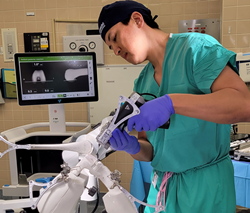
Dr. Daniel Chan is Memorial Healthcare System’s chief of orthopaedic surgery and sports medicine.
“The robotic arm facilitates the multiple cuts necessary for knee replacement based on patient-specific anatomical landmarks and soft tissue tension, while providing real-time intra-operative data that guides decision-making.”
HOLLYWOOD, Fla. (PRWEB)
April 05, 2022
With 900,000 knee replacements being performed in the United States each year, patients and surgeons alike are seeking the latest technology as they aim for improved outcomes, including greater mobility, less discomfort and a more rapid recovery. The award-winning surgeons at Memorial Orthopaedic Surgery and Sports Medicine Center are the first in South Florida to use the VELYS™ Robotic-Assisted Solution, a technology that helps them perform knee replacement surgery tailored to each patient’s unique anatomy to increase mobility, decrease pain and minimize recovery time, so patients can confidently return to their normal, active lifestyle sooner.
“This new robotic technology allows us to offer greater precision in terms of implant placement and soft tissue balancing for our patients, all in the hopes of improving patient outcomes,” said Dr. Daniel Chan, chief of Orthopaedic Surgery and Sports Medicine, Memorial Healthcare System. “The robotic arm facilitates the multiple cuts necessary for knee replacement based on patient-specific anatomical landmarks and soft tissue tension, while providing real-time intra-operative data that guides decision-making. Unlike other systems, the VELYS platform is completely image-less and does not require patients to go through the expense and radiation exposure of a pre-operative CT scan.”
It is estimated that 15% of current knee replacement patients are not fully satisfied after surgery due to persistent pain, stiffness, or instability. Every patient is unique and every knee is different; therefore orthopaedic surgeons at Memorial Regional Hospital South are using the VELYS™ Robotic-Assisted Solution to provide a patient-specific knee replacement surgical plan without the limitations of manual instrumentation. The use of the robot allows very precise adjustments in implant orientation and alignment to achieve a balanced knee throughout a full arc of motion with minimal soft tissue releases. This results for a more natural-feeling knee for the patient while also facilitating a rapid recovery.
“The Rehabilitation Institute at Memorial Regional Hospital South is poised to combine new technologies in complex orthopaedic surgeries with intensive rehabilitation to ensure our patients benefit from the continuum of care offered by our multidisciplinary teams – from diagnosis to surgery to rehabilitation and recovery,” said Doug Zaren, CEO, Memorial Regional Hospital South. “Our goal with every patient is to take them beyond their previous limitations into an active life in motion.”
Robotic-assisted knee replacement patients typically experience less pain and a faster recovery than traditional knee replacement surgery. Patients are encouraged to take the first step by scheduling a consultation with one of Memorial’s orthopedic specialists at 954-546-8902.
Memorial Orthopaedic Surgery and Sports Medicine Center is a fully-integrated, multi-disciplinary program based at Memorial Regional Hospital South consisting of specialists in orthopaedic surgery, primary care sports medicine, sports physiatry, cardiology, and sports medicine physical therapy. The program provides injury care, treatment for chronic musculoskeletal conditions, and routine checkups that include cardiac screening for athletes, performing artists, first responders and other active adults.
Memorial Regional Hospital South also houses Memorial Rehabilitation Institute, providing a wide array of inpatient and outpatient rehabilitation services to help maximize results. The team of specialists provides assessment, personalized treatment program development and progress monitoring for a variety of conditions, including stroke, brain injury, spinal cord injury, amputation, multiple trauma, neurologic conditions and multiple orthopaedic conditions.
Share article on social media or email:

